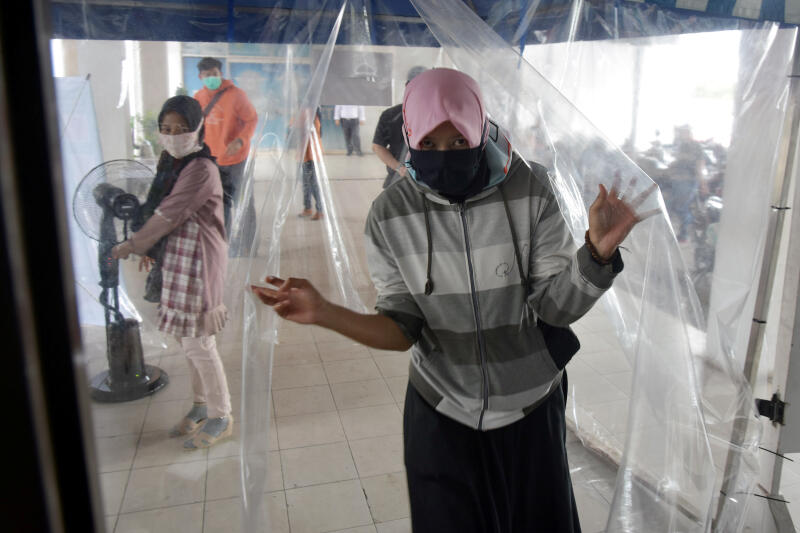Coronavirus: Indonesia set to bring 34 million people under partial lockdown
Sign up now: Get ST's newsletters delivered to your inbox

A woman leaves a disinfection chamber in Pekanbaru, Indonesia, on April 6, 2020.
PHOTO: REUTERS
Follow topic:
JAKARTA (BLOOMBERG) - Indonesia expanded a partial lockdown to more areas near Jakarta, the epicentre of the country's coronavirus cases, as the authorities stepped up efforts to restrict movement of people ahead of the nation's biggest festive season next month.
More than 15 million people living in Bekasi, Bogor and Depok - cities adjoining the national capital - were brought under large scale social distancing rules on Wednesday (April 15).
The stringent measures include a ban on public gatherings of more than five people, religious and social events and mandatory use of masks.
Residents of other satellite towns near Jakarta will implement the partial lockdown on Friday, and Pekanbaru, the first city outside the main island of Java, will roll out the measures on Saturday, according to the National Disaster Mitigation Agency.
That would take the total number of people under tighter social distancing rules to 34 million, official data show.
President Joko Widodo's administration also ordered airlines to limit the number of passengers to 50 per cent of aircraft capacity to make travel difficult and more expensive.
The government is also open to banning an annual exodus ritual of millions of people travelling to their hometowns this year amid risk of fanning infections, Coordinating Minister of Maritime Affairs and Investment Luhut Pandjaitan said.
"It is not impossible, say by next week or later on, the government may decide against the exodus," Mr Pandjaitan told reporters on Tuesday.
"If the flow of people doesn't subside, we can put a halt to it."
RAMADAN TRAVEL
While Jokowi, as the President is popularly known, has rejected calls for the kinds of travel restrictions and regional quarantines imposed in other parts of the world, he's banned government employees, military and police personnel and those employed by state-owned companies from travelling during Ramadan, while appealing to the general public to avoid trips in view of the pandemic.
Late spring is typically a peak travel time, as roughly one out of every eight Indonesians head home ahead of Eid al-Fitr, the Muslim festival marking the end of Ramadan.
Healthcare experts have called for a ban on the exodus, known as mudik, as it could spread the virus to more areas.
An estimated 19.5 million people travelled to their hometowns from big cities like Jakarta during last year's Eid.
In areas under stringent social distancing rules, trains, cars and buses are now allowed to carry only half the seating capacity and public transport is operating for fewer hours.
But the measures are not enough to stop the exodus and only an outright ban with stiff penalties can dissuade people from travel, said Mr Darmaningtyas, chairman of the Institute of Transportation Studies.
"People want to go home because there are no jobs in Jakarta and other cities," Mr Darmaningtyas said.
"Meanwhile, government aid has yet to be delivered and that's prompting people to return to their villages."
Mr Joko has rolled out a slew of social safety net and income support measures for daily wage earners, informal sector workers and street hawkers to prevent them from fleeing the cities.
An estimated 2.8 million people have become jobless after the outbreak of the virus in Indonesia.
The pandemic has killed 459 people in the world's fourth-most populous nation, the most in Asia after China, with almost 5,000 confirmed cases.
The Greater Jakarta area is the epicentre of the outbreak, accounting for more than two-thirds of infections and fatalities, official data shows.

